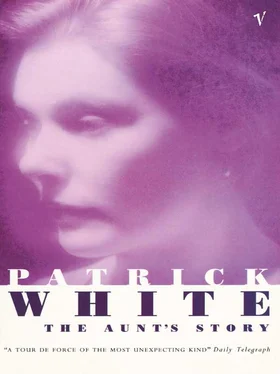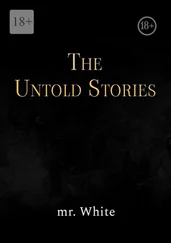‘Oh, I shall do nothing to shame you,’ said Alyosha Sergei. ‘I shall not die.’
No, remarked Mrs Rapallo, obliquely under her parasol, no, she said, he was not the kind.
‘Come,’ Alyosha Sergei,’ Katina Pavlou said, and went, ‘you shall sit beside me, because I love you.’
And she did. Now Katina Pavlou loved the world. She reached upward like the black and serious branches of the pines, outward like the all-embracing sea, she was self-contained as rock. See, I can see, her eyes said, as she touched the ridiculous arm of Sokolnikov. She could afford to love his ridiculousness, but he recognized the touch of charity.
‘Thank you, Varvara, you are kind,’ said Alyosha Sergei solemnly. ‘I think also you have grown.’
‘I am wearing higher heels,’ Katina said.
Even if it only half explained, it was necessary to say. Dry words can nourish.
It was as necessary as food. Theodora knew, pushing towards Sokolnikov the hard-boiled eggs. It was necessary that Sokolnikov should feel the final twinge. It was necessary that Katina Pavlou should discover fire. And Theodora Goodman, watching the charade move with all the hopes and hesitations of the human mechanism, knew that because she loved and pitied, the humiliation and the pain were also necessarily hers.
‘Thank you, Ludmilla, for your kindness,’ said Sokolnikov, accepting eggs.
Today his voice was old, and he looked with surprise to see in his hands eggs. He would beat together in his hands, to crack, two of the hard-boiled eggs, but it was no less strange. The cap cocked to listen. He could not have been more amazed if the sound had come from billiard balls.
‘On the estate of a female relative, Anna Stepanovna, who died in what may have been the necessary revolution, who shall say, there was an old man called Grishka, who had a little hen,’ said the voice of Sokolnikov.
But it was not the hour of much attention, so nobody listened to Alyosha Sergei. Sea lulled the bodies into fresh attitudes of anticipation, sleep, and melancholy. Directly under the sun the rocks, orange and stubborn, were painfully oblivious. Mrs Rapallo, clawing through kid, felt the prick of limpets. Sun fell through the slats of the pines, or revolved in catherine wheels on the inner flaps of the eyelids. Lieselotte counted many such revolving planets. Contentment was close, and coloured, and hot as sand.
‘I believe you are going to dislike me, Miss Goodman,’ Wetherby said.
He turned on her, on his elbows, his full face that was reminiscent of a pale ’cello.
‘I have reached the age of tolerance,’ said Theodora. ‘It is agreeably compact. Everything fits in, in time.’
‘This little hen was loved by Grishka,’ said Alyosha Sergei, who was already making mountains out of eggshells. ‘She had a cunning eye. She would sit on his chest, and pick grains of corn from out of his beard.’
‘I would still accuse you of disliking me, Miss Goodman,’ said Wetherby, ‘if I did not dislike myself.’
‘Then, if it is that way,’ Theodora said.
But because she did not lay on his forehead the cool hand of sympathy, which was his due, he went among the trees. She could hear him breaking twigs.
‘And when they held her up without her feathers, ready for the pot, as Anna Stepanovna insisted, although she was only a stringy little hen, old Grishka cried.’
‘Oh, chook, chook, chook! Dearest General, you have been telling a story,’ said Lieselotte, ‘and we have lost the thread.’
‘I flattered myself I was entertaining the company with a few reminiscences, however humble,’ the General said.
Mrs Rapallo held her glove to shield her face, of which the skin was stretched tighter than a drum.
Theodora watched Katina Pavlou go among the trees. She could see her white, crushed skirt. She could not hear, but in her own throat Theodora felt the words.
‘Why have you gone away from us?’ Katina Pavlou asked. ‘You are hurt, or irritated.’
Theodora felt the words. She saw the face of Katina Pavlou, where the sun fell between the trunks of the serious pines, the face waiting to give some token of love, or even to receive hurt.
‘I went, Katina, because I did not like myself,’ Wetherby said.
Theodora knew the words. She watched him take Katina Pavlou’s fingers, and read his own mind into the purple stains.
‘I shall like you,’ said Katina Pavlou. ‘If you will let me.’
‘I should love you, Katina,’ Wetherby said.
He watched her fingers tremble in his hand.
‘There is no need,’ said Katina Pavlou. ‘If you will let me, I shall love you enough. If you will let me show you.’
‘I don’t think you understand,’ he said, ‘all that it implies.’
‘Why should I understand?’ Katina Pavlou said. ‘I know !’
She could not love him enough. Theodora could not bear the beating in her throat. She was oppressed by a heavy music, a secret darkness of the trees, in which the sun just failed to glisten. Theodora watched Katina Pavlou’s face in Wetherby’s hands.
‘There,’ said Wetherby. ‘If you cannot see.’
‘But I see! Why should I not? Oh, but it is good to kiss. The world is good.’
‘Oh, but the world is sick,’ Wetherby said.
He began to cough for some afterthought.
‘You shall see as I do. Now it will be different. Because I shall love you,’ said Katina Pavlou.
‘Yes, you shall love me,’ said Wetherby.
But he began to walk away among the trees.
‘What’s got into Wetherby? ’E’s a queer one,’ said Miss Grigg. ‘And thin. Wetherby wants feedin’ up. Look at ‘im goin’ off. A regular scarecrow. Perhaps ‘e’s remembered or forgotten something.’
Lieselotte laughed. ‘Wetherby has forgotten what he wants. He has gone to look for it,’ she said.
Miss Grigg sucked her teeth. ‘Some people never know,’ she said. ‘Some people never know there’s nothing like food. Now, Mrs Rapallo, won’t you pick a wing of chicken? It’s a pity your girl Gloria couldn’t come.’
Theodora heard the stiff flutes miss, as Mrs Rapallo moved her parasol, dragging the crimson shadow across her face.
‘Donna Gloria,’ said Lieselotte, behind her eyelids and their fierce stars, ‘was otherwise engaged in Rome.’
‘In Monte,’ Mrs Rapallo corrected.
‘Mrs Rapallo, you say, in Monte!’
‘The Principessa arrived on the coast three or four days ago,’ said Mrs Rapallo. ‘She will drive over one day for lunch.’
‘In the blue Delage,’ said Lieselotte.
‘With the lacquered woodwork and the monograms,’ added Miss Grigg with mounting rapture. ‘And the electric lighter, and the vase for roses.’
‘And her mother’s monstrous egotism,’ said the General, who was crushing eggs.
But Mrs Rapallo, who had in her day withstood the blows of marble and the eyes of children, Mrs Rapallo did not hear.
‘My daughter’s rank,’ she said, ‘requires certain appurtenances.’
‘My daughter’s ice,’ said the General, whose humility had begun to glitter.
‘Let us pick up the pieces, Miss Goodman,’ suggested Lieselotte.
She began, with her small deft hands, which at times could appear innocent of motive, to gather the sodden cardboard, the fragments of food, and the emotional shreds of the paper napkins.
Then the picnic is finished, Theodora realized, rolling the hot napkins into a neat ball.
But not the sea. The sea had stretched out into the flat serenity of afternoon. The sea no longer folded and unfolded, offering between spasms the possibility of a drowned face. Blue opened and opened, fetched up the distance, quenched thought and metal. Feebly resisting the moment of transparence, a paper napkin that someone had let float stroked the noses of fish.
Читать дальше












